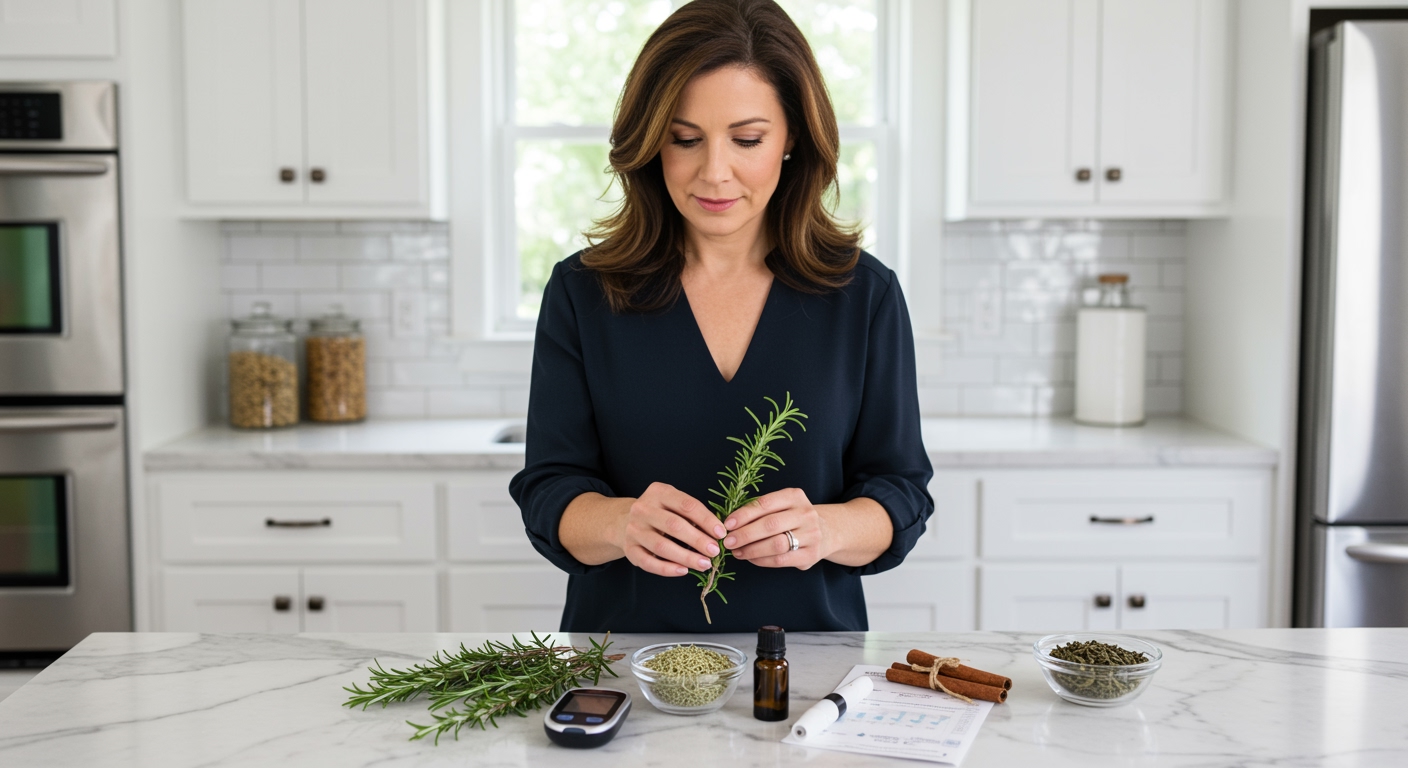✪ Key Takeaway: Rosemary shows promise for diabetes management through compounds that may improve insulin sensitivity and reduce blood sugar spikes.
Introduction
Your kitchen spice rack might hold a secret weapon against diabetes that you never knew existed.
Many people with diabetes constantly search for natural ways to support their blood sugar management alongside their prescribed medications.
Hi, I’m Abdur, your nutrition coach and today I’m going to explain how rosemary might become a valuable addition to your diabetes management strategy.
What Makes Rosemary Special For Blood Sugar?
Rosemary contains powerful bioactive compounds that researchers believe can influence blood sugar levels in meaningful ways.
The herb’s primary active ingredients include rosmarinic acid, carnosic acid, and carnosol, which work together to create anti-inflammatory and antioxidant effects throughout your body.
These compounds appear to enhance insulin sensitivity, which means your cells become better at using glucose from your bloodstream.
When insulin sensitivity improves, your body needs less insulin to move sugar from your blood into your cells where it belongs.
Research suggests that rosemary may also slow down the absorption of carbohydrates in your digestive system, preventing rapid spikes in blood sugar after meals.
This mechanism works by inhibiting certain enzymes that break down complex carbohydrates into simple sugars.
✪ Fact: Rosmarinic acid in rosemary is the same compound found in other diabetes-friendly herbs like sage and oregano.
How Does Rosemary Actually Work In Your Body?
When you consume rosemary, its active compounds travel through your digestive system and enter your bloodstream within 30 to 60 minutes.
Once in circulation, these compounds begin interacting with your cells in several important ways that benefit blood sugar control.
First, rosemary compounds help reduce chronic inflammation in your body, which is a major contributor to insulin resistance.
Chronic inflammation interferes with insulin signaling pathways, making it harder for your cells to respond properly to insulin.
Second, the antioxidants in rosemary protect your pancreatic beta cells from oxidative damage caused by high blood sugar levels.
These beta cells produce insulin, so keeping them healthy is crucial for maintaining proper blood sugar control over time.
Third, rosemary may help improve glucose uptake by your muscle cells, which are major consumers of blood sugar for energy production.
✪ Pro Tip: Fresh rosemary contains higher levels of active compounds compared to dried versions stored for long periods.
What Does The Research Actually Say?
Several studies have examined rosemary’s effects on blood sugar, and the results are genuinely encouraging for people with diabetes.
A study published in the Journal of Medicinal Food found that rosemary extract significantly reduced blood glucose levels in diabetic rats over a four-week period.
The researchers observed a 20 percent reduction in fasting blood glucose levels compared to the control group that received no rosemary.
Another study involving human participants showed that consuming rosemary tea daily for eight weeks led to improved insulin sensitivity markers.
Participants also experienced reduced levels of inflammatory markers in their blood, which correlates with better long-term diabetes management.
Laboratory studies have demonstrated that rosemary compounds can inhibit alpha-glucosidase enzymes by up to 85 percent.
These enzymes break down complex carbohydrates into simple sugars, so inhibiting them helps prevent rapid blood sugar spikes after meals.
✪ Note: Most research used concentrated rosemary extracts, which may be more potent than culinary amounts.
How Should You Use Rosemary For Diabetes?
The most practical way to incorporate rosemary into your diabetes management plan is through regular culinary use and herbal teas.
Fresh rosemary works best because it contains the highest concentration of active compounds that may benefit blood sugar control.
You can add fresh rosemary to roasted vegetables, grilled meats, soups, and stews to enhance both flavor and nutrition.
Rosemary tea offers another excellent option, made by steeping one teaspoon of fresh leaves in hot water for 10 minutes.
Drinking this tea 30 minutes before meals may help slow carbohydrate absorption and reduce post-meal blood sugar spikes.
Some people prefer rosemary supplements, but these should only be used under medical supervision due to potential interactions with diabetes medications.
Remember that rosemary works best as part of a comprehensive approach that includes proper diet, regular exercise, and prescribed medications.
✪ Pro Tip: Grow rosemary at home for a constant supply of fresh leaves with maximum potency.
Are There Any Risks Or Side Effects?
Rosemary is generally very safe when used in normal culinary amounts, but there are some important considerations for people with diabetes.
Large amounts of rosemary may potentially interact with certain diabetes medications, particularly those that lower blood sugar.
This interaction could cause your blood sugar to drop too low, leading to hypoglycemic episodes that can be dangerous.
People taking blood thinning medications should also exercise caution because rosemary may enhance the effects of these drugs.
Pregnant women should avoid large medicinal doses of rosemary, though normal cooking amounts are considered perfectly safe.
Some individuals may experience digestive upset, headaches, or skin irritation when consuming large amounts of rosemary.
Always start with small amounts and monitor your blood sugar levels more frequently when adding rosemary to your diabetes management routine.
✪ Note: Never replace prescribed diabetes medications with rosemary or any other herbal remedy.
The Bottom Line
Rosemary shows genuine promise as a natural complement to traditional diabetes management through its ability to improve insulin sensitivity and reduce blood sugar spikes.
The best medicine is often hiding in plain sight, waiting for us to recognize its true potential.
I would love to hear about your experiences with rosemary or any questions you might have about incorporating herbs into your diabetes management plan, so please share your thoughts in the comments below.
References
At NutritionCrown, we use quality and credible sources to ensure our content is accurate and trustworthy. Below are the sources referenced in creating this article:





